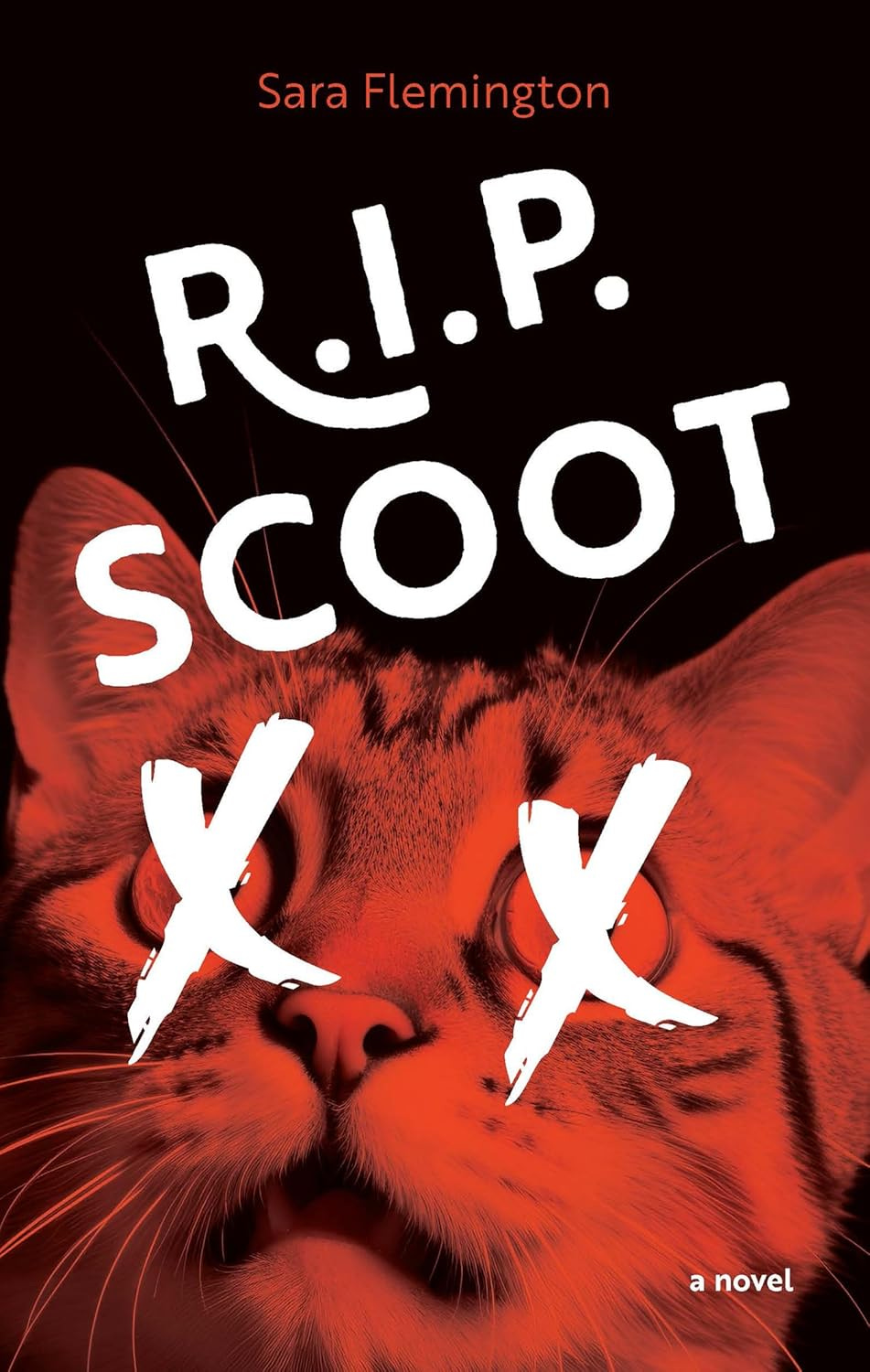R.I.P. SCOOT by Sara Flemington
Reviewed by Emily Weedon
Everyone writing screenplays these days has a copy of the book Save The Cat. It preaches that the hero must do something when we first meet them, so that we like them. Right away, Flemington’s main character does indeed save the cat, but fleetingly. R.I.P. Scoot, the book, by its very title, does not save the cat. It practically starts with a dead cat, briefly a companion for oddball protagonist,Austin. The novel follows Scoot connections through wild internet chases down conspiracy-esque rabbit holes that tie in Japanese muralists and Walmart squatters.
“R.I.P. Scoot is wearing mystery togs while playing dress up. Hats and pillowcases off to Flemington for creating this wonky mystery-esque world.”
It is weird with a capital W. (I mean that as a compliment, even if I am not always a weird for weird’s sake person.) It wears the clothes of a mystery, but fair warning - it does not follow mystery rules which hardcore mystery readers flock to. R.I.P. Scoot is wearing mystery togs while playing dress up. Hats and pillowcases off to Flemington for creating this wonky mystery-esque world.
Mystery purists like robust deductive reasoning they can guess along with or out guess, using their superpowers, rather than relying on coincidence. R.I.P. Scoot has coincidence - zany synchronicities that could be cut scenes that didn’t make it into the Police’s original music video for Synchronicity… I must further digress and say, I get the impression that many hardcore mystery fans are Mensa level cryptic-cross word types. They are not to be let down, not to be crossed, never to be under clued. The very idea of plotting a mystery to satisfy purists is therefore quite terrifying to me.
R.I.P. Scoot is what I dub Quirk Core – a term I just made up - a literary, wry, rum, romp through the insanities of the world as we know it, told through the eyes of an innocent, Austin, to lay bare the cruelties and slights and injustices of this world and perhaps soften us to moments of charm - like newly grown fur over bald patches. There’s a tang of George F Walker here playwright champion of the poor; the characters and situations in RIP Scoot are reminiscent of Walker’s legendary championing of the poor, the disenfranchised and the mad. Fans of Halle Butler’s wild, woolly and definitely weird Banal Nightmare would be very much at home in these pages - these pages full of gentle misunderstandings about lattes and wet pillowcases used as satchels/toe warmers.
The calculus in a how-to book like Save The Cat is all about creating protagonists readers are compelled to root for. Some people find this overbearing, especially acolytes of plotless fiction. Plotless fiction doesn’t do goals, per se. R.I.P. Scoot falls into a space, like a favourite earring knocked behind the couch by a cat paw, somewhere between plotless moments and plotted rooting for the arguably lovable, erratic and odd Austin. It chases plot the way a cat chases a sunbeam.
I appreciate Austin’s microscopic focus, and Flemington relays minute detail through her protagonist, often with aching precision. Sometimes I do find the degree and depth of detail takes over from the story. Flemington describes everyday things like the use of towels or the scrolling of social media with the remove of a naif discovering those things for the first time. In some ways, this is the biggest job description for writers. Observe and report. Describe coffee to someone who has never tasted it. Or heard of it. Or cups. Or drinking. Or mouths. This approach can yield incredible poignancy, as it frequently does in Flemington’s work. Likewise, the oddball lead character, Austin. On the whole, I like Austin, even if I spend a fair bit of time wondering if I misread or misunderstood something.
I think the point of a book like R.I.P. Scoot which is as charming as a thrifted sweater, is to sink into the weird, just melt into the couch and marvel as the plot goes in 360 directions, teases, taunts and does its’ thang. It’s wild, it’s woolly, it’s flea-ridden, but deeply cute. It’s Scooby-Doo on mushrooms in a dystopian discount store. So go on, grab the Scooby-snacks and settle in not to Save the Cat but to travel, for a while, with the ghost of the cat.
About the Author
Sara Flemington is the author of the novel Egg Island. Her short fiction has appeared in the Feathertale Review, Painted Bride Quarterly, Eclectica, subTerrain and others. Sara lives in Toronto.
About the Reviewer
Emily Weedon is a CSA award-winning screenwriter and author of the dystopian debut Autokrator, with Cormorant Books. Her forthcoming novel Hemo Sapiens will be published in September 2025, with Dundurn Press. https://emilyweedon.com/
Book Details
Publisher : Nightwood Editions (Feb. 25 2025)
Language : English
Paperback : 210 pages
ISBN-10 : 0889714827
ISBN-13 : 978-0889714823




